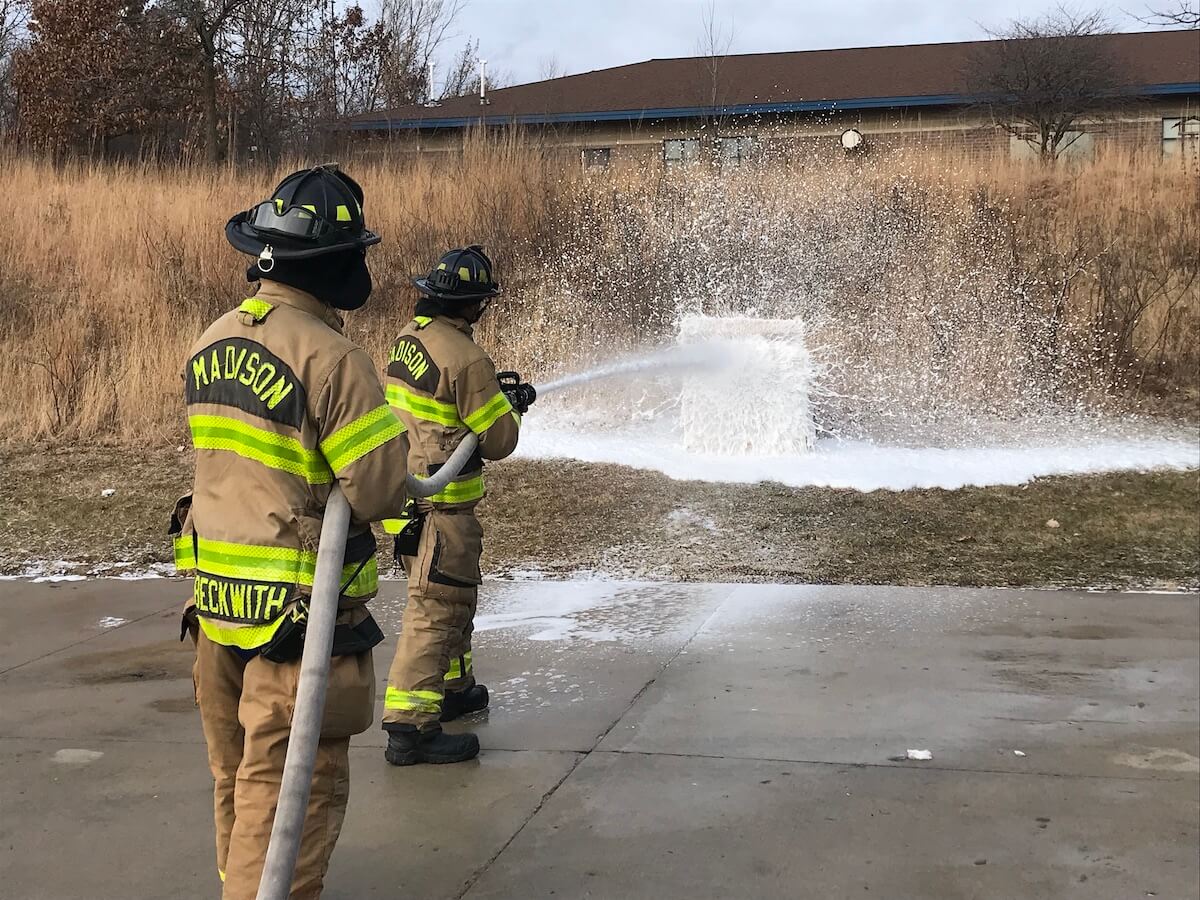
#image_title
#image_title
Public comment period open through Sept. 24 on proposal to reissue wastewater permit, reducing discharge of arsenic, forever chemicals into Menominee River.
The state Department of Natural Resources issued a statement Thursday saying it intends to place restrictions on a Marinette company 11 days after a spill that sent water contaminated with arsenic and “forever chemicals” into the Menominee River.
The DNR said it plans to reissue a wastewater permit to Tyco Fire Protection Products, a subsidiary of Johnson Controls, that proposed substantial reductions in the amount of arsenic the company can discharge as well as limits on PFAS, commonly referred to as “forever chemicals” because they remain in the environment.
That permit would mandate that the company reduce arsenic levels in its discharge water and would remove PFAS as part of upgrades to the existing groundwater treatment system, according to the DNR news release. The draft permit limits PFAS at Michigan’s water quality standard of 11 parts per trillion because the Menominee River is considered an interstate water. The DNR currently is considering adopting a 20 million parts per trillion level in Wisconsin.
The DNR plans a Sept. 24 virtual hearing to solicit public input before a permit would be issued. The public can submit written comments until that date to [email protected]. The public notice, including instructions for attendance of the virtual public hearing, will be posted on the DNR website.
The proposed restrictions come in the wake of a July 26 spill at the Tyco facility where firefighting foam, a major PFAS-polluting substance, is produced. The water was released from the site and into a stormwater sewer that feeds directly into the river.
Environmental advocates in Wisconsin said the recent spill at Tyco is another sign of the need for greater regulations of PFAS. Currently the Environmental Protection Agency has issued a health advisory for PFAS but does not list it as a regulated substance, meaning there is not an enforceable standard for the substances. More than 4,000 chemicals are listed as PFAS substances health experts say cause cancer, liver damage, thyroid problems and other health issues.
“The DNR is doing what it can in the absence of state standards,” said Carly Michiels, government relations director for Clean Wisconsin,. “But that’s the problem. We don’t have state standards. These substances have been unregulated.”
The state Legislature has failed to enact regulations of PFAS, environmental groups said. Last session the Republican-led state Assembly failed to approve a bipartisan bill that would have regulated PFAS, provided funding for more testing of those chemicals along with dollars for research and remediation efforts.
That legislation died, however, when the Assembly failed to take it up during its last session, in February. The Assembly did approve a PFAS-related bill during that session that banned the use of firefighting foam during training of firefighters, but that action already was considered an industry wide best practice.
Assembly Republicans at the time acknowledged the bill didn’t go as far as some would have liked, but further study of the issue was needed, they said.
Michiels said her organization and other environmental advocates are “extremely disappointed” at the Legislature’s failure to back the PFAS legislation. Many other states have enacted regulations for PFAS, she said, and the same must happen in Wisconsin to protect residents’ health.
“There is this urgency of the contamination problem,” she said, “when you see the impact it is having on people. But there is so much inaction on the part of the Legislature. You have people at high risk of significant health problems, and the Legislature is doing nothing to address it.”
In November 2017 Tyco officials admitted that PFAS had spread beyond the company’s 380-acre fire technology center, where testing and fire-control training had occurred since 1962. State records show the company knew about the pollution for four years before revealing that information.
Doug Oitzinger, the former Marinette mayor and current City Council member, has watched since then as some residents have been forced to to drink bottled water after learning their water supplies were contaminated with PFAS. Many people live in fear they, their children or others will develop severe health problems because of exposure to the chemicals.
Like Michiels, he expressed frustration at the Legislature’s failure to pass a bill regulating PFAS.
In fact, Oitzinger said, the measure that was approved, backed by state Rep. John Nygren, R-Marinette, “was worse than nothing” because it shifted the burden of PFAS cleanup costs from the companies where contamination occurs to taxpayers.
“We were outraged,” Oitzinger, said of the reaction of those who had worked on proposed PFAS regulations.
Oitzinger isn’t alone. He is a member of the Marinette-area organization S.O. H2O (Save Our Water) that continues to work toward PFAS regulations. Their community isn’t alone in Wisconsin dealing with the issue, he said, noting it is one of 30 sites statewide, such as Madison, Milwaukee, and Rhinelander where PFAS contamination has been detected.
“This is a horrible mess,” Oitzinger said, “ and we have to do something about it. These chemicals are called ‘forever chemicals,’ and that means this is going to be a ‘forever problem.’”
Politics

What’s the difference between Eric Hovde and Sen. Tammy Baldwin on the issues?
The Democratic incumbent will point to specific accomplishments while the Republican challenger will outline general concerns he would address....

Who Is Tammy Baldwin?
Getting to know the contenders for this November’s US Senate election. [Editor’s Note: Part of a series that profiles the candidates and issues in...
Local News

Stop and smell these native Wisconsin flowers this Earth Day
Spring has sprung — and here in Wisconsin, the signs are everywhere! From warmer weather and longer days to birds returning to your backyard trees....

Your guide to the 2024 Blue Ox Music Festival in Eau Claire
Eau Claire and art go hand in hand. The city is home to a multitude of sculptures, murals, and music events — including several annual showcases,...



